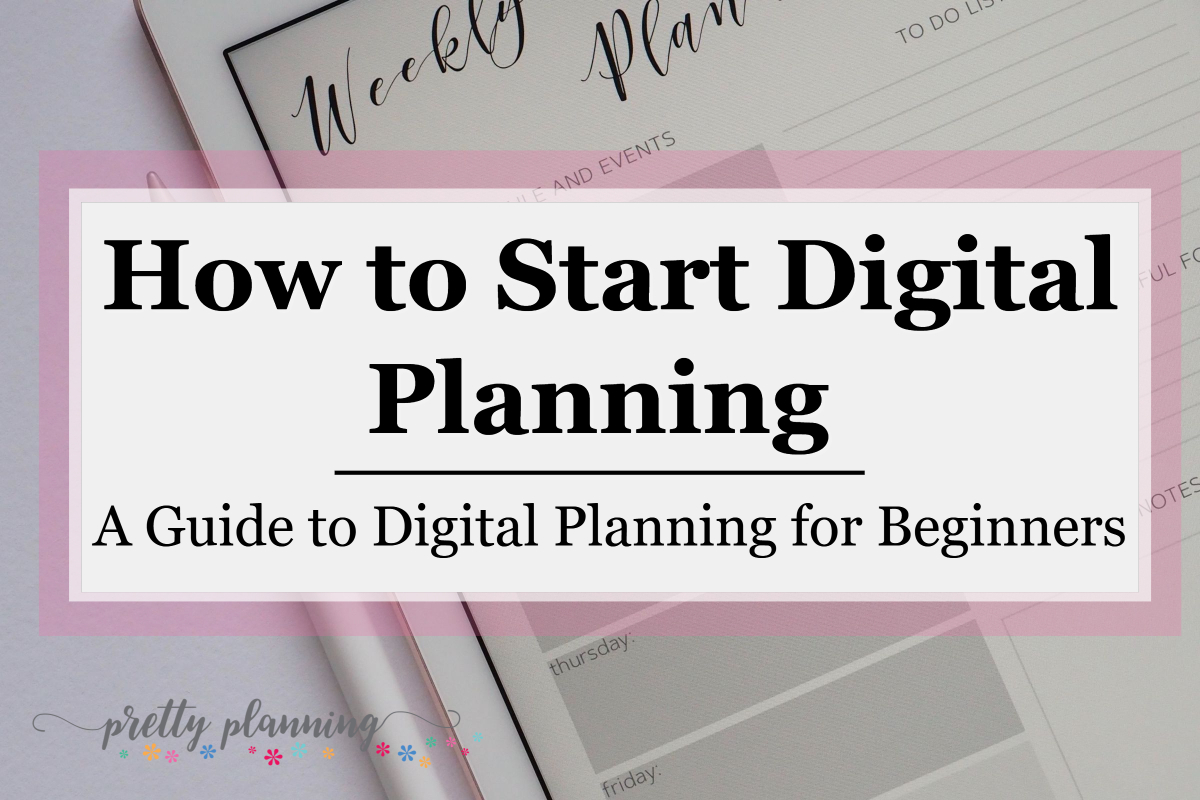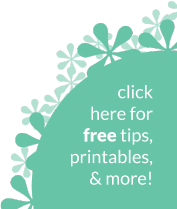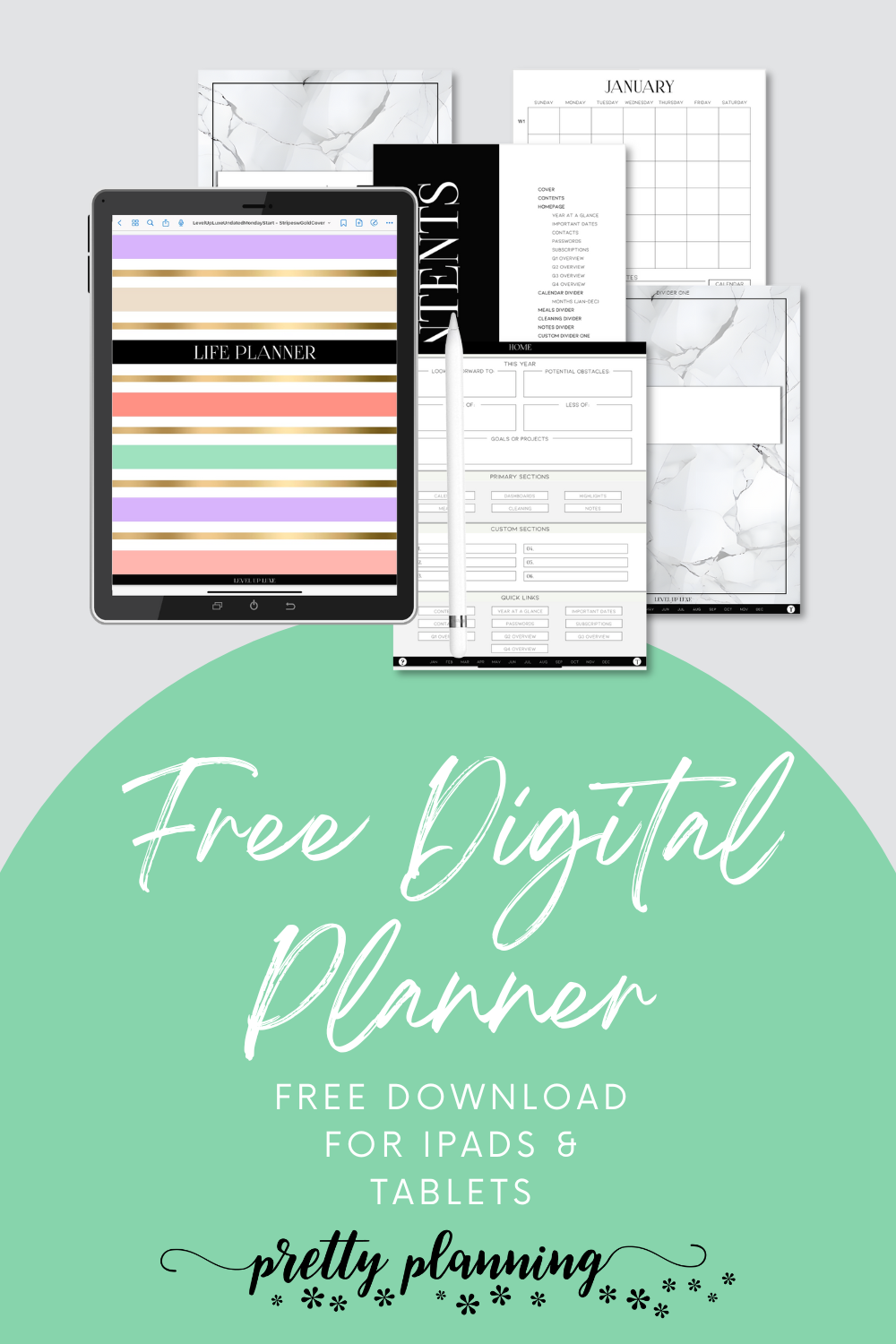How to Start Digital Planning - A Guide to Digital Planning for Beginners
If you're wondering what digital planning is and how to start digital planning, you've come to the right place! Like paper planning, digital planning offers a convenient and efficient way to stay organized, manage tasks, track habits, and achieve goals.
However, did you know digital planning has a lot more to offer? The top three benefits include:
- Added flexibility and customization
- Quick navigation via hyperlinks
- Increased portability
Whether you're a student, a professional, or simply someone looking to streamline your life, I'll walk you through the essentials of how to start digital planning using PDF documents formatted for use in notetaking apps including GoodNotes, Notability, and Noteshelf, step by step.
From choosing the right tools to setting up and customizing your digital planner, I've got you covered.

What is Digital Planning?
Digital planning is increasing in popularity and is the ideal alternative to paper planning. Just like paper planning, digital planning helps you get organized and stay productive. You can plan your schedule, keep a to-do list, track your goals, and more!
Digital planners come in a Portable Document Format (PDF), which allows you to annotate (or “write on”) using a PDF annotator or note taking app.
A touchscreen tablet with a stylus allows you to use a digital planner in the same way you would use a paper planner.
You get all the advantages of a paper planner in addition to added functionality, such as adding and duplicating pages in an instant, inserting photos, and copying images.
What are the Benefits of Digital Planning?
If you're looking for ways to get organized and be more efficient, digital planning might be the answer.
The top benefits of digital planning include:
Customization and Flexibility: Digital planners can be easily customized to fit your unique needs. You can add pages, delete pages, and move pages around with the simple click of a button. Many digital planners come in a variety of styles and color options. For additional customization, you can add digital stickers and widgets to your planners.
Have you ever written an important note and forgotten the page it was written on? The notetaking app your planner is stored in allows you to search both typed and written text within the planner, making is easy to find important notes and information.
Ease of use and Hyperlinks: Correcting mistakes is super easy! Simply click delete or use the eraser tool within your app. Hyperlinks allow you to quickly navigate within your planner. Just tap a hyperlink and you will be automatically taken to the page or section you need.
Storage and Portability: If you are the type of person that uses several planners for different areas of your life (personal, business, health/fitness), you can store all of those planners in a single device, such as your tablet, smart phone, or laptop.
Environmentally Friendly: Digital planners are friendly to the environment and a great way to reduce paper usage and decrease your carbon footprint. If you choose an undated digital planner, it can be reused year after year.
What are the Pros and Cons of Digital Planners?
Digital Planner: Pros and Cons
Advantages of Using a Digital Planner
- You can quickly correct mistakes
- Duplicate the pages you like
- Remove pages you don't use
- Reuse your planner (undated versions)
- Easily move text and stickers
- You can type using fonts
- Handwrite using an iPen or stylus
- Create your own designs and layouts
- Access in a digital device
- Reuse digital stickers
Disadvantages of Using a Digital Planner
Missing Paper Planning: You might miss the feel of paper planning and prefer writing on paper versus a screen.
Solution: There are paper feel screen protectors available that mimic the texture of paper.
Electronically Dependent: If the device you use is not charged or you can't connect to Wi-Fi, you won't have access to your digital planner.
Solution: Carry a portable charger with you if you are out and about. You can also print important pages directly from your digital planner.
Lack of Privacy: Digital planners can compromise your privacy.
Solution: Make sure your password is secure and use two-step security.
Screen Fatigue: Spending a lot of time online comes with a price, screen fatigue can cause eyestrain and headaches.
Solution: Give your eyes a break by looking away from the screen. Practice the 20-20-20 rule: every 20 minutes focus on something 20 feet away for a minimum of 20 seconds.
How to Start Digital Planning: What do you Need?
The three simple steps below cover how to start digital planning:
1. Decide which device you want to digitally plan on. If you plan on paper and want to switch, the best alternative is an iPad or tablet. It will feel like you are writing in a paper planner, and the size is similar. An Apple Pencil or stylus (optional) will allow you to write on your planner.
2. Download and install a notetaking app such as Goodnotes, Notability, Noteshelf, Zoomnotes, or Xodo onto your device. Xodo and Noteshelf work if you're using an Android device. Some apps are paid, one-time purchases. The app will allow you to edit and write in the digital planner (similar to a paper planner).
3. Now you're ready to choose a planner! Try our free undated digital planner, check out our shop (or shop around) for digital planners, inserts, and stickers, or get inspiration from Pinterest. Check out our tips below for choosing a digital planner.
How to Choose a Digital Planner
There are a variety of digital planners available, so take your time to explore your options and find one that resonates with you.
Look for features that align with your needs:
- Will the sections and/or categories help you plan and organize the different aspects of your life?
- Do the page layouts fit your planning style? What calendar pages will you use (yearly, monthly, weekly, daily)?
- Can you easily navigate to important pages and sections?
- Are there additional templates that can be used to customize the planner? Included within the planner or expansion packs?
If you're not sure if digital planning is right for you, give it a try using our free digital planner.

